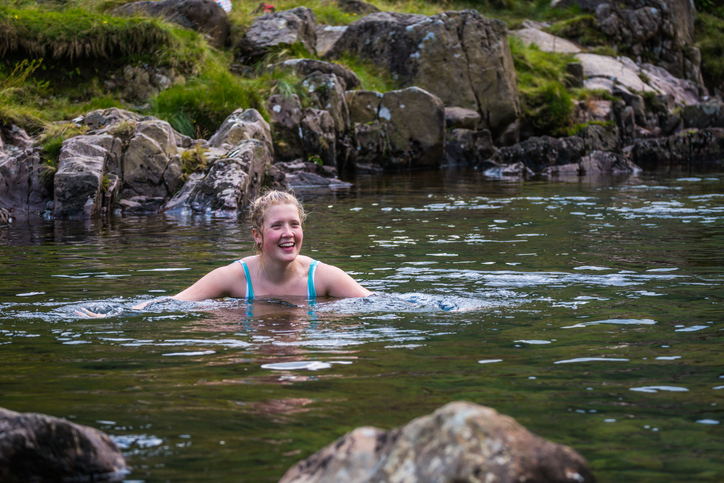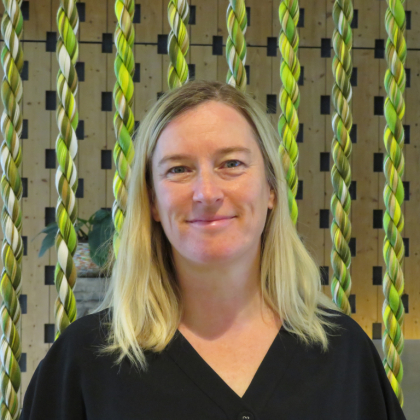Tuesday, 22 March 2022
A new project to encourage more people to reap the health benefits of ‘wild swimming’ has been launched by a group of researchers at the University of Nottingham.
Wild swimming has had a surge in popularity in the UK over the past few years, particularly during the Covid-19 pandemic, and the benefits to physical and mental health are now well-documented. Numerous studies have shown this type of swimming in cold water in a natural environment can boost not only fitness, but greatly improve mood, reduce tension, negativity, and depression.
However, information about, and access to, natural ‘blue spaces’ such as rivers, lakes, or the sea, tend to be local and disparate and not on the radar of wider communities, in both cities and rural areas.

The research team at Nottingham consists of linguistics and placed-based literature experts, with health policy and freshwater ecosystem specialists. They will work with a long list of partners including Cardiff University, Swim England and the Black Swimming Association, to pull together a comprehensive overview and toolkit on the mental and physical health benefits of wild swimming as well as guidance on the risks related to water quality and safety of specific swimming spots in the UK.
Central to the research will be a new online survey aimed at existing wild swimming groups and prospective swimmers to test attitudes to and knowledge of the benefits of this activity. The team will also investigate the history of some of the specific wild swimming locations mentioned in the survey. They will also develop textual, graphics and video content to show how swimmers can make informed decisions about the safety of water conditions and possible toxicity or contamination of open water locations.

Other key priorities of the project are to create a comprehensive roadmap for the scaling up of wild swimming as a powerful health and wellbeing intervention. This will include an analysis of the interplay of national public health agencies, local authority public health departments, national sports development agencies and NHS bodies. Importantly, the results of the research will inform new policy briefs to help with commissioning and promotion of wild swimming at a local and national level.
 Professor Svenja Adolphs, School of English, University of Nottingham
Professor Svenja Adolphs, School of English, University of Nottingham
Leading the Wild Swimming and Blue Spaces project, Professor of English Language and Linguistics, Svenja Adolphs, said: “Wild swimming and blue space recreation offer the potential for significant physical, social, emotional and cultural gains. This project will use a creative, multidisciplinary approach to develop authentic public messaging that ensures these benefits can be realised equitably and at scale, thus leveraging the use of blue spaces as community assets to combat health inequalities. We are building on the large number of successful local initiatives that are working to address barriers to wild swimming for their communities, and we will surface, study and share evidence that can be used by promoters and commissioners of wild swimming as a possible health and wellbeing intervention.
Co-investigator Dr Dawn Knight, based at Cardiff University's School of English, Communication and Philosophy, said: "Whilst the potential health benefits of wild swimming are generally well acknowledged, there lacks a coordinated approach to communicating this to all members of a community. In this project, we aim to fill this gap by bringing together a range of experts from the arts and humanities and health and ecological sciences to help create better informed and targeted public health messages about the health benefits, safety aspects and histories of the blue spaces in which people swim."
 Professor Suzanne McGowan, Netherlands Institute of Ecology
Professor Suzanne McGowan, Netherlands Institute of Ecology
International co-investigator, Professor Suzanne McGowan, from the Netherlands Institute of Ecology, said: “Health benefits of blue spaces may be compromised by poor water quality. Microscopic organisms in contaminated waters can cause illness in swimmers, but we don’t know the extent to which users of blue spaces are able to assess water quality risks before they decide to swim. Our aim is to gauge how informed swimmers are about water quality risks and empower users of blue spaces to make good decisions about when and where they swim.”
Jane Nickerson, CEO of Swim England said: “Swim England are delighted to be partnering in this project which aligns with a number of our core strategic goals, enabling access to swimming for a diverse range of participants and to increase the visibility of aquatic sports. This research will further develop our own understanding of the barriers to access and explore how health inequalities can be addressed through open water swimming, including how we might develop content that truly appeals and in turn creates a happier, healthier and more successful nation through swimming.”
Danielle Obe, chair and co-founder of the Black Swimming Association said: “The BSA’s primary aim is to diversify the world of aquatics, and that includes our wonderful open water spaces. There is a certain stigma in Black and Asian communities attached to discussing mental health concerns, so we are hopeful that our work in encouraging more inclusion in this space can help to break these barriers down and normalise these discussions. To do this, we need to provide equitable knowledge of, and safe access to, wild swimming spots so that every community can have a quality experience of the well-documented physical and mental benefits that come with getting into the open water.”
The project ‘Wild Swimming and Blue Spaces: Mobilising interdisciplinary knowledge and partnerships to combat health inequalities at scale’ is funded by AHRC, MRC and NERC and runs from January 2022 to January 2023. It is led by the University of Nottingham in collaboration with Cardiff University and the Netherlands Institute of Ecology, and working in partnership with Swim England, Black Swimming Association, The National Trust, Freshwater Biological Association, UK Centre for Hydrology and Ecology, Leicestershire County Council, Norwegian Institute for Water Research, Partners Health, and Thrive Agency.
Story credits
For more information, please contact Professor Svenja Adolphs, School of English, University of Nottingham, via email svenja.adolphs@nottingham.ac.uk or Emma Thorne, Head of News on 0115 951 5798 or emma.thorne@nottingham.ac.uk
Notes to editors:
About the University of Nottingham
Ranked 97 in the world and 17th in the UK by the QS World University Rankings, the University of Nottingham is a founding member of Russell Group of research-intensive universities. Studying at the University of Nottingham is a life-changing experience, and we pride ourselves on unlocking the potential of our students. We have a pioneering spirit, expressed in the vision of our founder Sir Jesse Boot, which has seen us lead the way in establishing campuses in China and Malaysia - part of a globally connected network of education, research and industrial engagement.
Nottingham was crowned Sports University of the Year by The Times and Sunday Times Good University Guide 2024 – the third time it has been given the honour since 2018 – and by the Daily Mail University Guide 2024.
The university is among the best universities in the UK for the strength of our research, positioned seventh for research power in the UK according to REF 2021. The birthplace of discoveries such as MRI and ibuprofen, our innovations transform lives and tackle global problems such as sustainable food supplies, ending modern slavery, developing greener transport, and reducing reliance on fossil fuels.
The university is a major employer and industry partner - locally and globally - and our graduates are the third most targeted by the UK's top employers, according to The Graduate Market in 2024 report by High Fliers Research.
We lead the Universities for Nottingham initiative, in partnership with Nottingham Trent University, a pioneering collaboration between the city’s two world-class institutions to improve levels of prosperity, opportunity, sustainability, health and wellbeing for residents in the city and region we are proud to call home.
More news…